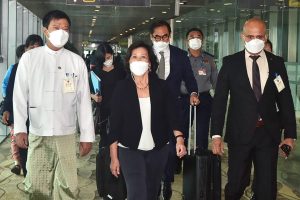The United Nations special envoy for Myanmar will step down from her post later this month, a spokesperson for Secretary-General Antonio Guterres said yesterday, after a 20-month tenure in which she has drawn fire from both the military junta and its opponents.
Singaporean sociologist Noeleen Heyzer, who was named Guterres’ special envoy to the country in October 2021, “will conclude her assignment on 12 June” when her contract ends, Guterres’ spokesperson Stephane Dujarric said yesterday, according to AFP.
Dujarric said that the secretary-general “is thankful to Ms. Heyzer for her tireless efforts on behalf of peace and the people of Myanmar,” and that a new envoy will be appointed shortly.
Chris Gunness of the Myanmar Accountability Project, who tweeted about Heyzer stepping down late yesterday, cited unconfirmed reports that her mandate had been “cut short” for unspecified reasons. Indeed, Heyzer’s tenure has been considerably shorter than her predecessor, the Swiss diplomat Christine Schraner Burgener, who served from April 2018 to October 2021 – a period of three-and-a-half years.
Heyzer’s position – not to be confused with the position of U.N. special rapporteur on human rights in Myanmar – was created in 2018 in response to the Myanmar military’s vicious ethnic cleansing of Rohingya populations in Rakhine State. Its mission has since been subsumed within the political turmoil prompted by the military’s coup in February 2021.
After taking up her post in late 2021, Heyzer assumed the thankless task of urging the Myanmar junta to engage in political dialogue with its opponents and cease its violent crackdowns. The challenges facing her mandate were illustrated by the trip she took to Myanmar in August of last year, when she attempted to coax junta chief Senior Gen. Min Aung Hlaing into ceasing airstrikes and arson attacks and engage in political dialogue, among other things.
Her trip was immediately criticized by rights groups and local activists as both fruitless and likely to be used by the military to bolster its claim to legitimacy. Conversely, speaking plainly about the military, prompted blowback from the other direction. When Heyzer asserted after her trip to Myanmar that “U.N. engagement does not in any way confer legitimacy,” part of a longer statement describing the junta’s lack of cooperation during her trip, the military responded with its own press release stating that Heyzer’s statement was “one-sided” and had “created misunderstandings about Myanmar.”
After her August 2022 trip, Heyzer later vowed not to visit the country again unless she was allowed to meet deposed leader Aung San Suu Kyi, a request that was refused the first time around, and publicized meetings with representatives of the NUG As she put it in March of this year, she was “not going back unless it is meaningful and I can facilitate a change or see a change in the direction” of the junta’s thinking.
By the start of this year, Heyzer was advocating the creation of an “Inclusive Humanitarian Forum” to boost cross-border aid, with the aid of “key ethnic armed organizations, the NUG, and humanitarian civil society organizations.” The forum, which would also include member states including neighboring countries and other regional actors, would aim “to open up operational space to deliver humanitarian aid through all available channels” and to “identify ways to overcome obstacles for operational actors to more effectively reach those in need.”
In this, she offered a distinct contrast to the approach of Yangon-based U.N. agencies, which have been forced to operate within the strict boundaries imposed by its need for the consent of its host government (i.e. the junta). In recent months, U.N. agencies have attracted growing criticism for funneling humanitarian aid through military-controlled institutions, and for participating in a junta-led pilot repatriation program for Rohingya refugees in Bangladesh. (One observer suggested that the notion of the Inclusive Humanitarian Forum had met little interest from within the U.N. system.) Officials within Myanmar tend to argue that some accommodation is necessary in order to preserve projects that continue to benefit many people.
In sum, Heyzer can probably be said to have done a good job, given the difficulty of playing honest broker in a context of extreme polarization and mutual hostility.
Whether her impending replacement marks any sort of change in Guterres’ approach to Myanmar remains unclear. Gunness of the MAP said yesterday that the best thing would be for the position to remain vacant, given that the military junta had little interest in negotiating in good faith. “High-profile mediators only benefit the illegal junta & bring controversy when they ‘dare’ to meet the [NUG] & ethnic nationalities,” he said. “Myanmar needs silent, invisible diplomacy.”













